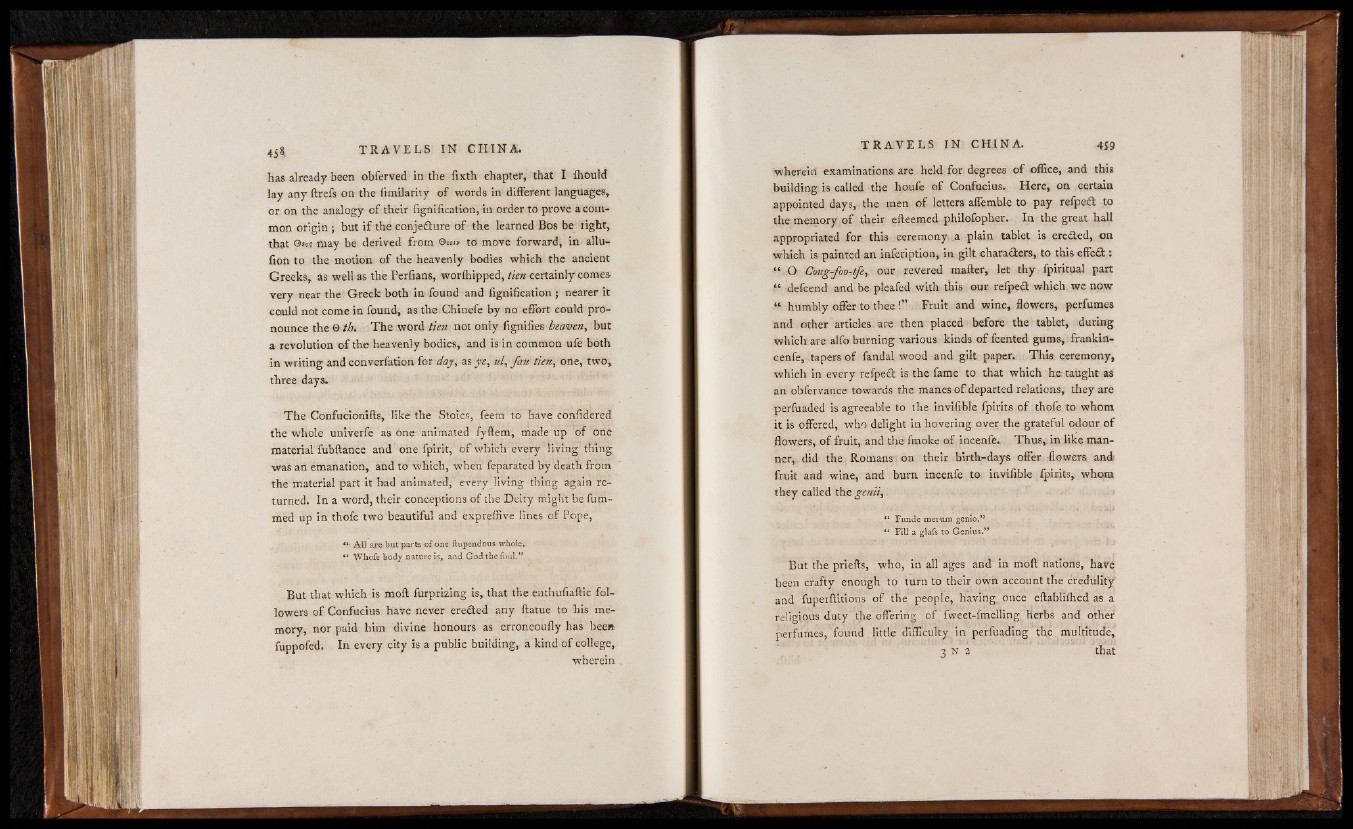
has already been obferved in the fixth chapter, that I ihould
lay any ftrefs on the limilarity o f words in different languages,
or on the analogy o f their fignification, in order to prove a common
origin ; but i f the conjeiture o f the learned Bos be right,
that ©so? may be derived from ©«» to move forward, in allu-
fion to the motion o f the heavenly bodies which the ancient
Greeks, as well as the Perfians, worihipped, tien certainly comes-
very near the Greek both in found and fignification ; nearer it
could not come in found, as the Chinefe by no effort could pronounce
the © tb. The word tien not only fignifies heaven, but
a revolution o f the heavenly bodies, and is in common ufe both
in writing and converfation for day, as ye, ul, fa n tien, one, two,
three days.
The Confucionifts, like the Stoics, feem to have confidered
the whole univerfe as one animated fyftem, made up o f one
material fubftance and one fpirit, o f w hictrevery living thing
was an emanation, and to which, when feparated by death from
the material part it had animated, every living thing again returned.
In a word, their conceptions o f the Deity might be fum-
med up in thofe two beautiful and expreifive lines o f Pope,
“ A l l are but parts o f one ftupendous whole,
“ Whofe body nature is,_ and God the foul.”
But that which is moft furprizing is, that the enthufiaftic followers
o f Confucius have never erefted any ftatue to his memory,
nor paid him divine honours as erroneoufly has been
fuppofe'd. In every city is a public building, a kind o f college,
wherein
wherein examinations are held for degrees o f office, and this
building is called the houfe o f Confucius. Here, on certain
appointed days, the men o f letters aflemble to pay refpedl to
the memory o f their efteemed philofopher. In the great hall
appropriated for this ceremony a plain tablet is ere£ted, on
which is painted an infcription, in gilt chara&ers, to this effed :
O Cong-foo-tfi, our revered matter, let thy fpiritual part
“ defcend and be pteafed with this our refped which we now
“ humbly offer to thee I’V Fruit and wine, flowers, perfumes
and other articles, are then placed before the tablet, during
which are alfo burning various kinds o f fcented gums, frankin-
cenfe, tapers o f fandal wood and gilt paper. This ceremony,
which in every refped is the fame to that which he taught as
an obfervance towards the manes o f departed relations, they are
perfuaded is agreeable to the invifible fpirits o f thofe to whom
it is offered, who delight in hovering over the grateful odour o f
flowers, o f fruit, and the fmoke o f incenfe. Thus,, in like manner,
did the Romansi on their birth-days offer flowers and
fruit and wine, and burn incenfe to invifible fpirits, whom
they called the genii,
“ Funde merum genio.”
<t Fill a glafs to Genius.”
But the priefts, who, in all ages and in moft nations, have
been crafty enough to turn to their own account the credulity
and fupetftitionV o f the people, having once eftablifhed as a
religious duty the offering o f _ fweet-fmelling Herbs and other
perfumes, found. little difficulty in perfuadlng the multitude,
3 n 2 that